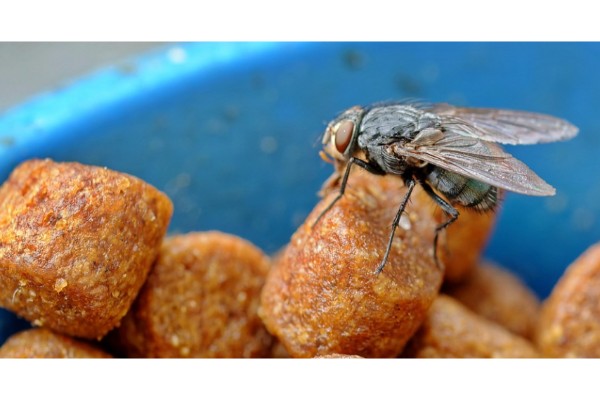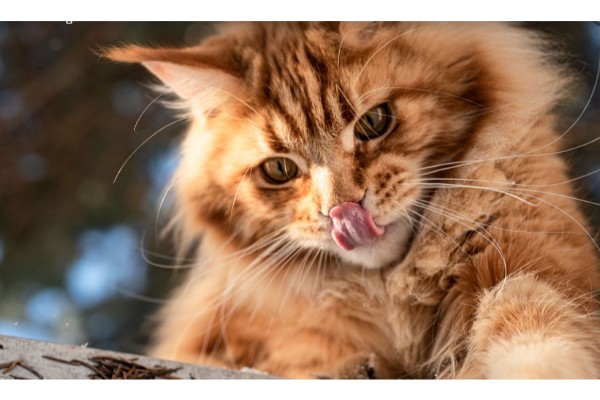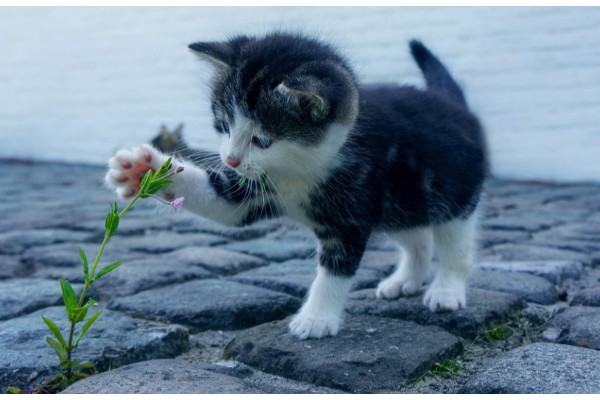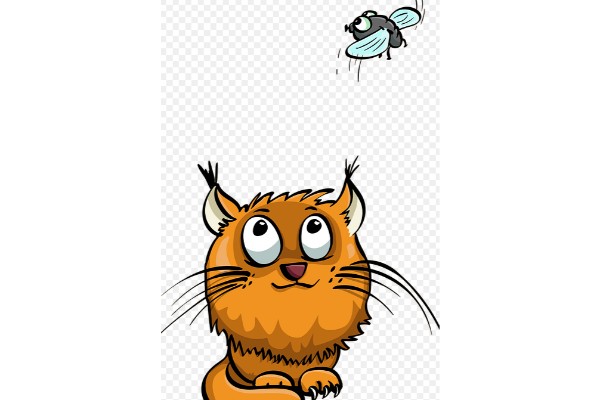Flies rarely harm cats in the long run, and cats can safely digest flies without getting sick. The fact that flies are a source of protein, iron, magnesium, and calcium outweighs the numerous health risks, although flies do carry dangerous bacteria, fungi, and other pathogens. Eating flies may seem like an unpleasant choice, but some cats actually enjoy going after, catching, and eating them.
Table of Contents
Why Do Cats Hunt And Eat Flies?

Although domesticated, cats remain predatory animals. They act in hunting behavior because they have a hunting instinct. Their wild counterparts depend on prey, which frequently includes small mammals, birds, reptiles, and sometimes even insects. This is so because each one of them has the protein the cat’s body needs to survive.
A domestic cat is not required to hunt prey in the same way as a wild or feral cat. Their guardian provides them with food. Although they may be nutritionally satiated, their hunting instinct does not stop. This is crucial because if a cat is ever separated from its guardians, for whatever reason, it must find a way to survive.
Despite the potential need to hunt, it’s crucial to realize that the urge to hunt can also arise on its own, unrelated to hunger. A cat may continue to chase and hunt potential prey, such as flies, even after it has eaten. The introduction made reference to some unclear chattering and chirping sounds. Some researchers believe it is a noise related to the anticipation of a killing bite, i.e. the bite which severs the spine of their prey and prevents them from escaping.
The cat’s head may move from side to side, as is also evident. In order to avoid missing their target when they attack, they must determine how far away their prey is from them. If we worry about the type of prey the cat is going to chase, we should note that cats generally don’t attack prey that is larger or more dangerous than they are. Even with small prey, there are some possible risks, so we should be aware of that.
Psychological Reasons
It won’t be a problem for a cat that is both psychologically and physically healthy to hunt flies. However, if we see the cat hunts flies all the time and shows other signs of restlessness, it is possibly a sign of boredom.
Eventually, cats with low levels of stimulation will exhibit behavioral issues. For this reason, if we see our cats eating flies all the time, we might want to intervene by improving their environmental enrichment. We can encourage cats to exercise their natural hunting instinct in a healthy way by providing scratching trees, raised platforms, toys, and brain teasers. It is crucial for their guardians to make sure their cats receive appropriate stimulation and enough time with them. Take a look at our video above to see how you can better entertain your cat

Is Eating Flies By Cats Acceptable?
As we have seen, it is not uncommon for our cat to hunt and eat a fly. Small insects should not harm them when consumed because of their small size. In fact, the fly can supplement their diet with some natural protein. Whether the fly will carry specific pathogens that could harm the cat’s immune system is a matter of concern. However, even flies that carry specific diseases may do so in such small numbers that they do not pose a health risk.
On the other hand, there are some situations where the fly’s consumption can harm the cat. There may be strong bacteria and microbes that, when ingested by cats, could harm their bodies. Parasites can also be present in the fly which then infest the cat’s gastrointestinal system. This is because eating flies can cause worms in cats. Even some flies, like the bot fly, can parasitize cats by tunneling under their skin.
We need to watch out for any signs of digestive issues whether or not we see our cat eating flies. These include vomiting and diarrhea, as well as noticing the presence of eggs in their stool. Speak to your veterinarian right away if you suspect your cat has any pathology as a result of eating flies. Your cat needs to be dewormed and immunized in order to avoid diseases that could arise from eating flies. Keep to the deworming and vaccination schedules.
Is It Bad For Cats To Eat Flies
No, cats eating flies are usually not harmful. You don’t need to be concerned about your cats putting on weight when they go fly hunting because eating flies doesn’t have a significant calorie benefit.
Flies are a good source of entertainment even though they don’t have much in the way of nutrition.
Though they occasionally carry parasites that could be dangerous for young kittens, flies are not known to transmit many cat-affecting diseases. This means that once your cat is old enough to catch flies, they are typically okay for them to catch and eat.
Thankfully, this means that cat owners don’t need to worry about preventing their cats from eating flies. For your cat, it may not make much sense, but it’s some enjoyable and safe entertainment.
Can Cats Get Worms From Eating Flies
Technically speaking, there are a few different kinds of parasitic worms that cats can acquire by eating flies. However, unless they have additional medical issues, those worms don’t usually pose a problem for adult cats.
However, because their immune and digestive systems haven’t fully matured, younger cats and kittens may experience complications from the worms. This means it’s crucial to watch out for symptoms of parasitic infection in your kitten, such as weight loss or worms in their feces.
Having said that, if you notice your cat losing weight or refusing to eat after they’ve been fly-hunting, you might want to have them checked for worms. In rare instances, flies or other sources in your home can spread worms to healthy adult cats.
Depending on where you live and the kinds of parasites that are most prevalent there, regular deworming may also be necessary for your cat or kitten.
Does Eating Flies Cause Cats Get Maggots?
It’s unlikely that cats would consume maggots from flies. However, cats that chase flies are more likely to get a fly bite, especially if they are allowed outside, and long-haired cats are more susceptible to this.
Blowflies in particular leave itchy bites and lay their eggs in them. As soon as the eggs hatch, they transform into maggots that feed on the cat’s decomposing flesh. A unique enzyme found in the saliva of maggots can also penetrate the skin and frequently result in bacterial infections.
Symptoms of maggots in cats include:
- White worms found on the skin
- Red, inflamed skin
- Raised, pus-filled sores
- Moist or oozing skin
- Biting and scratching at the infected skin
- Vocalizations
- Difficulty sleeping
Although eating flies won’t result in maggots, cats shouldn’t be encouraged to chase flies in case they infect themselves with maggots. They hurt and are uncomfortable, and they can be very traumatic for cats and their owners.

Why Do Cats Play With Flies Before Killing Them?
Hunting serves other crucial purposes for cats besides attempting to obtain food. The cat catching a fly and either not eating it right away or not at all is an example of this. In these cases, we often see the cat stun the fly and then play with them. They might let the fly get a little further away before launching at them once more, then doing this repeatedly. Although it may appear cruel, the cat benefits from this in significant ways. The reasons for this behavior include:
- Skill development: kittens have an innate hunting instinct, but they also have to hone this instinct by developing skills. In addition to practicing on their siblings, the children practice the techniques their mother teaches them in order to better understand their abilities and limitations. When the mother and other kittens are taken away, the cat will seek out new players to practice these skills with. Other domestic pets, their human caregivers, tiny creatures like flies, or even inanimate objects, could be the cause of this.
- Health: practicing hunting in this way is also important for well-being. A cat will experience physical and emotional under-stimulation and boredom if they are not given the chance to use its instinct. They may even start acting aggressively when this occurs, which will lead to behavioral issues. This is one of the reasons cats will play with their prey and spend a lot of time trying to eat flies, in addition, to actually trying to do so.
- Maternal instinct: it is known that female cats tend to play with their prey more than males. Female cats’ maternal instinct to care for their young is thought to be the cause of this. Mother cats frequently bring to the kittens partially-alive prey so they can practice hunting because the kittens need to learn this for themselves. Males do not care for kittens in the same manner as females do, though they may still play with flies before eating them.
- Safety: Finally, cats will also prolong their hunt to ensure they are not in danger. Even though cats will make an effort to hunt smaller animals, some prey can actually hurt the cat. Rats, for instance, have pointed teeth, and bees have stings. Because of this, the cat must first knock the prey unconscious before approaching it to kill it. If the cat is unsure of the safety of the flies, it may even hesitate to approach them.
How To Prevent Your Cat from Eating Flies
It is best to stop cats from consuming flies. The possibility of parasites and worms alone is enough to make them a health threat, even though the occasional fly won’t do too much harm.
You must therefore devise strategies to stop your cat from ingesting flies. To do so, follow these steps:
Redirect Attention
Distract your cat with its favorite toys the next time a fly is buzzing around the house. The best toys are those that mimic prey, such as feathers on a stick, laser pens, or fake mice.
Open a window or door while your pet and you are playing, and encourage the fly to go out through it.
Feed Treats
Feeding your cat treats when flies are present is another effective way to divert attention. Your pet won’t be as tempted to eat a fly because it will be more tempted by a treat, keeping it from being in the proper state of hunger.
You will have time to remove the fly from the area where your cat is while it is enjoying a snack.
Remove The Fly
Flies require assistance to leave the house because they are not the most intelligent animals. Use a magazine or another object to encourage it to fly through an open window or door in order to prevent it from taking off on its own.
Despite your temptation, avoid using poisonous insecticides near your cat in case it accidentally ingests one. They can poison cats, as was mentioned.
How To Keep Flies Away From Cats
Fly attacks happen more frequently in some homes than others. You’ll need to switch your strategy to prevent flies from bothering cats if your cat can’t help but hunt and isn’t deterred by distraction techniques.
To do so, you could:
- Put mesh screens on open windows and doors to let air in while keeping flies out.
- Unconsumed wet cat food should be stored in the refrigerator covered.
- Clean up spilled food and beverages and cover all food waste.
- When you notice cat droppings in the yard, immediately scoop them up.
- To naturally repel flies, place citronella candles all over your house.
- Spray lemongrass, peppermint, lavender, or eucalyptus around your house instead of using citronella candles because flies detest these scents.
- Never pile leaves or grass clippings close to your home.
- The use of mouse or rodent traps should be avoided because dead animals attract flies.
- Rats, mice, and dead birds should be disposed of safely by sealing them in a bag and putting them in the trash.
By taking these precautions, you should be able to keep flies out of your house and reduce the likelihood that your cat will catch and eat them.
FAQs

Can Flies Lay Eggs On Cats?
Due to the fact that larval flies (maggots) eat rotten meat, flies may attempt to lay eggs close to an open wound on your cat. Although maggots can be an unsettling sign for cats, it’s a good idea to keep in mind that they only consume dead meat and can even be used in some medical procedures.
In any case, it’s critical to take your cat to the vet as soon as you notice maggots on its skin or in its fur. Your veterinarian can treat any wounds that draw flies and may also prescribe antibiotics or other medications to hasten your cat’s quick and trouble-free recovery.
What If My Cat Ate Fly Eggs?
There is typically no issue with eating fly eggs that were laid on your cat’s food or somewhere else. Your cat’s digestive system will break down the eggs, which usually won’t cause any issues.
Although it’s possible that the food the eggs were laid on was tainted or had gone bad. Otherwise, it wouldn’t have drawn the flies in the first place. As soon as you become aware of the contamination, throw away any food that has been contaminated with fly eggs.
In order to give the flies fewer food sources and make them less likely to linger, it might also be a good idea to clean out any containers that contained contaminated food and make an effort to keep the area a little neater.
Do Cats Attract Flies?
Technically speaking, cats don’t draw flies, but their feces can. An old litterbox or poop outside of a litterbox can be a good place for flies to lay their eggs and may increase the population of flies in the area.
In order to prevent fly infestations, you must ensure that your cat uses the litterboxes and maintain a reasonable level of cleanliness in the boxes.
If you have a lot of flies, it may be a sign that you need to clean up some mess because flies are drawn to rotten food and other messes.
What If My Cat Has Eaten A Fly With Insecticide?
It’s possible that a cat could get hurt if it eats a fly that has been poisoned or killed with an insecticide. Depending on the insecticide, the cat will likely be harmed. How harmful will depend on the potency of the toxins and the amount ingested by the cat.
If we see flies being consumed by the cat, we need to exercise caution because we might use insecticide and leave dead flies lying around the house. Look for any signs of intoxication and take them to the veterinarian immediately if they start to look lethargic or show any symptoms of poisoning.
